Late notice as usual on the ‘What’s Next?’ tumblr, but for my 33rd birthday I started a new tumblr called The Mechamorphoses. It collects transforming Transformers poems written by my friends and fellow poets.
“A poet of fantastic inversions.” Poetry London
“Multifaceted, mega-fabricated, louche architecture.” Magma
“Voraciously experimental, precociously accomplished.” Poetry International

Late notice as usual on the ‘What’s Next?’ tumblr, but for my 33rd birthday I started a new tumblr called The Mechamorphoses. It collects transforming Transformers poems written by my friends and fellow poets.
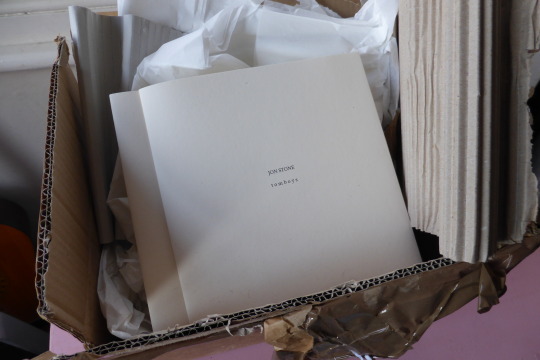
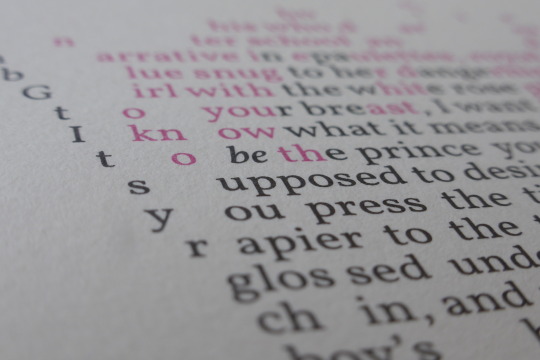
Tomboys is a limited edition (74 copies) signed pamphlet published by Tungsten Press, printed by Frank Turenhout and Hans Dessens on Zerkall Butten and Zerkall Restauro. It comprises three colour-concrete poems in the shape of (and concerning) Revolutionary Girl Utena, Cowboy Bebop’s Radical Edward and Miyazaki’s Nausicaa of the Valley of the Wind.
A single signed copy costs £20 and when it’s gone it’s gone.
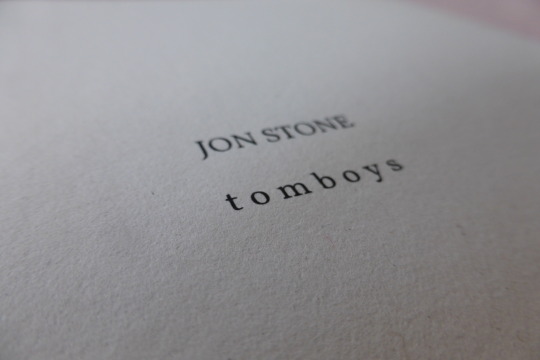
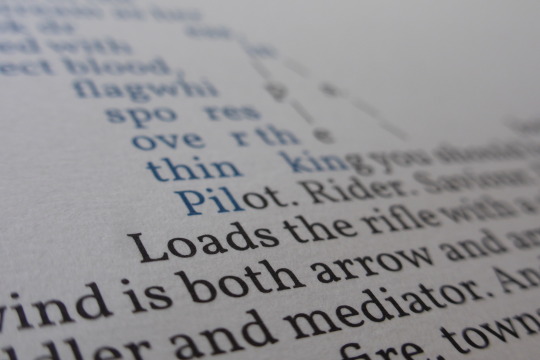
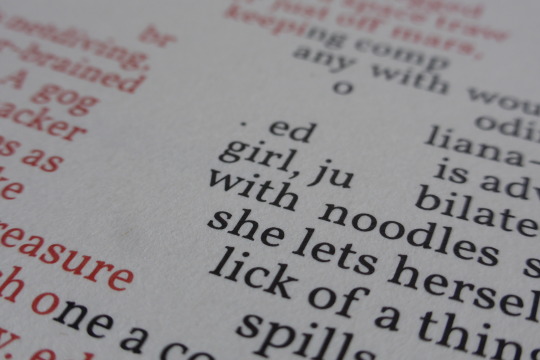
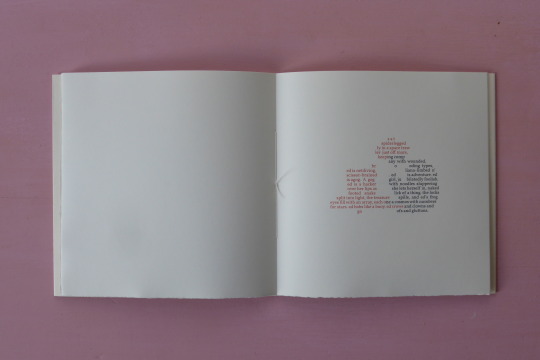
Written and performed by Abigail Parry and myself for Burns Night 2016 at the Beer Boutique in Putney, with mild guitar accompaniment.
(intro)
Ground Control to Major Tom,
Is there a bard of rustic song?
But with a frater-feeling strong, here heave a sigh.
Ground Control to Major Tom,
Alas, how chang’d the times to come!
Should auld acquaintance be forgot and auld lang syne?
i.
One fond kiss, and then we sever;
One farewell, alas, for ever!
Never gonna fall for
Modern love. Walks beside me.
Modern love. Walks on by.
Believe me, happiness is shy,
And comes not when it’s sought.
Deep in heart-wrung tears I’ll pledge thee,
Warring sighs and groans I’ll wage thee.
Oh lordy. Oh lordy.
You know I need some loving.
The shrieking of nothing is killing.
Who shall say that Fortune grieves him,
While the star of hope she leaves him?
Wham, bam, thank you, ma’am.
I gotta straighten my face.
As fair art thou, my bonnie lass,
So deep in love am I –
Which came as some surprise. I thought you died
a long long time ago.
Hot tramp, I love you so.
And I will love thee still, my dear,
While the sands o’ life shall run.
Don’t you wonder sometimes
‘bout sound and vision.
Time, he flexes like a whore,
falls wanking to the floor –
catch the moments as they fly
and use them as you ought.
Catch the moments as they fly –
there’s a starman waiting in the sky.
Believe me, happiness is shy,
and comes not when it’s sought.
iii.
Do you remember a guy that’s been
in a masonic song?
I heard a rumour from Kilmarnock:
my love is like a red, red rose.
Great chieftain o’ the pudding-race,
I’m haggis, hope you’re haggis too.
(A mother’s lament for the death of her son.)
Beware o’ bonie Ann;
Your heart she will trepan
In wood and wild, ye warbling throng.
Her blush is very like the morning, orning, orning, orning, orning.
Ashes to ashes, funk to funky.
iv.
As I walked by myself, I said to myself,
And myself said again to me
Let the children lose it. Let the children use it.
Let all the children boogie.
Then I answered myself, and I said to myself
Whatever be my degree
You’re too old to lose it, too young to choose it
And the clocks wait so patiently.
I laughed and shook his hand
And made my way back home.
I’m the laughing gnome and you can’t catch me
Said the laughing gnome.
Ha ha ha. Hee hee hee.
v.
You’ve got your mother in a whirl.
Her grief-worn heart’s wild-eddying swirl.
She’s not sure if you’re a boy or a girl –
Dark-muff’d, outstretch’d, down headlong hurl.
Hey, babe, your hair’s all right.
Ye, like a rash-buss, stood in sight.
Hey, babe, let’s go out tonight.
The star’s shoot down wi’ sklentin’ light.
You like me and I like it all,
Through the ragged roof and chinky wall.
We like dancing and we look divine.
Gie fools their silks and knaves their wine.
You love bands when they’re playing hard,
When thowes dissolve the snowy hoord.
They put you down, they say I’m wrong,
So vengeance ‘arm, ensanguin’d, strong,
You tacky thing, you put them on
Beneath the milk-white thorn.
Rabbie, Rabbie, you’ve torn your kilt.
Rabbie, Rabbie, yon ale is spilt.
Rabbie, Rabbie, nae mair shall flow.
I now have an artist page on the BBC website. It says I died 18 years ago. I don’t believe I was consulted on this.
More encouragingly though, they have recordings of five of my poems!

I made ‘Wounding Blisses’, an interactive poem/analogue fighting game, for CONTROL ROOM, an event I co-organised with Abigail Parry for the GameCity festival in Nottingham.
Before I expand on that short paragraph, a little personal history: between the ages of 12 and 15 (estimated) I wrote and drew detailed plans for a number of different games in the style of Street Fighter II, Mortal Kombat, One Must Fall, Body Blows and so on, some of which I fully intended to send on to game developers. Content-wise, my efforts were diligently derivative – to the point where the female characters flashed their underwear while performing special moves and one outline bore the title ‘Fatal Klash’ – but I was remarkably prescient in one respect: I proposed that these games utilise the same technology as 3D cinema and television, so that the fighters seemed to project out of the TV screen.
I only mention this by way of noting that ‘Wounding Blisses’ is a sort of return to the genre after a 17-year break.
The subtitle to the CONTROL ROOM event was ‘Poetry Micro Arcade’, the broad concept being that festival attendees would ‘play’ the poems individually, like they might an arcade machine, and we’d have ’em queueing all round the block to figuratively plug their change into the slots. There were four interactive pieces in total, each manned by a different poet. Abby debuted the beta version of her digital riddle-poem ’Room Escape’. Made using the Twine engine, it’s a cross between a Muldoonian textual maze and a Myst-style puzzle box. There’s a particularly clever sequence where the player must turn the ‘lights’ in the game on and off, inverting both the text and the page/screen in order to progressively reveal more words, in a way that’s reminiscent of how the visual echo of a light filament gives the impression of floating symbols in a dark room.
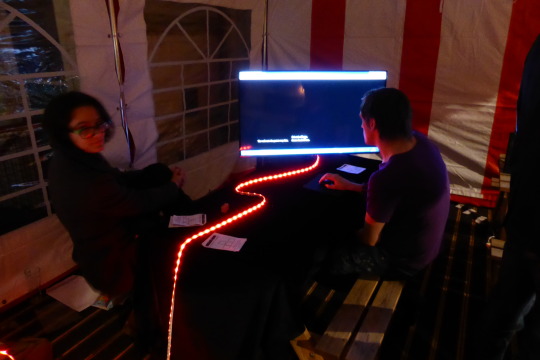
Harry Man came up with ‘Jetpack’, an input-generated poem based on the 1983 game of the same name. Players re-arrange a kind of countdown sequence in order to create their poem and are then entered into a high score table.
Abi Palmer revived ‘The Alchemist’, a piece which supplements a player-chosen elemental poem with contrasting sensory stimulus – like the smoke from a blown-out match, or water being poured over the knuckles and wrists.
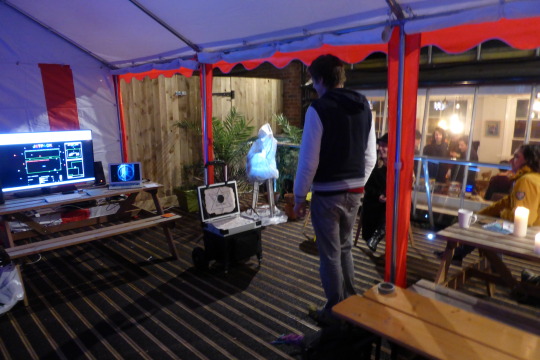
Then there was ‘Wounding Blisses’. The title is from a line in the Earl of Rochester’s ‘My Dear Mistress has a Heart’. Players pick from a roster of historical/mythical characters who came to ruin through affairs of the heart, including General Revanche (Georges Ernest Boulanger) and Phaedra. An opponent is then picked, followed by a stage (one of five abandoned, wrecked or desolate places from around the world), before the player and the game-master (me) take turns reading lines to each other that describe the course of the battle, in any order. The concluding lines are then picked from a random red or purple envelope.
In short, it’s designed (a) so that there are hundreds of possible variations of the poem, (b) so that the performance is an exchange, with both participants reading aloud, and © to mimic the structure of rounds in a physical dust-up, but with a surprise ending.
I came away from CONTROL ROOM feeling all evangelical about the potency of interactive performance poetry as compared to the usual stand-up-and-talk poetry reading. Because it involved so much repetition on my part, the words gained a kind of weight as the evening wore on – that is, the poem began to feel more real, more physical, even though it was constantly changing. And whereas I’ve always struggled, when reading from a stage, to get a lock on what the audience is thinking, it’s very easy in a one-to-one performance to make that connection, and therefore to hold someone’s attention.
I also really enjoyed it.
Feedback was largely positive, with several people coming over to my table saying, “I’ve been told I’ve got to play this.” This was a non-poetry audience who were being invited to listen to and recite heroic couplets, senryū, unrhymed tercets and other units of verse – there was no guarantee they would be particularly receptive to it. Younger players seemed the most unconvinced, partly because the twist ending to the poem is always that no one wins. I guess that’s what ultimately makes it a poem apeing a game more than a game with poetic elements.
More of this, I think, and about a decade after it catches on someone might even get a Ted Hughes Award for it.
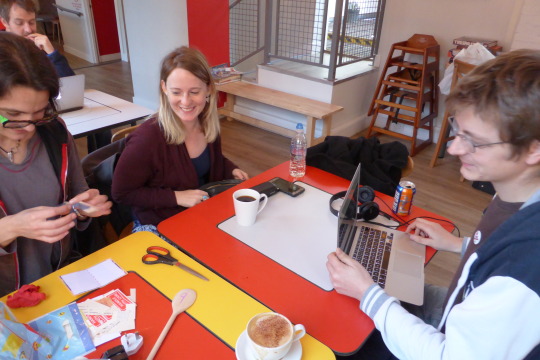
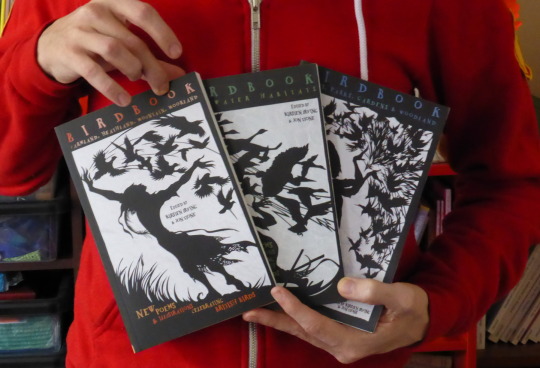
‘Nightjar’, which won last year’s Poetry London competition (see this post) is included in the new Sidekick Books anthology Birdbook: Farmland, Heathland, Mountain, Moorland.
Also included is an accompanying illustration of a nightjar, the style of which is based on World War 2 dazzle ship camouflage.
My thanks to the editors of the book, Kirsten Irving and … me! Yes, I have for some years been committing the dubious act of placing my own poems in anthologies I have edited. This is because Sidekick’s anthologies are not really anthologies in the traditional sense – that is, compilations of existing works or excerpts – but collaborative texts where we invite a whole load of other artists to join us at the party. ‘Nightjar’ was written for this book and this book alone, although as I’ve said, the delay in production meant there was time to also enter it into the aforementioned competition.
I feel like I have to stress that because there’s a general view of anthology-type books as primers or showcases that are intended to either provide an overview of a particular area of concern, or else lead the reader on to the more serious works that inform them. That’s to say, their composition is rarely analysed in the way a full single-author collection is analysed – for thematic threads, or accumulations of sound and imagery. Such threads or accumulations, if they are noticed, are often proposed as defects in some sort of project of ultimate variety, a black mark against the pluralist intentions of the editors.
The assumption, then, is that the natural context for any poem included in an anthology is the single-author collection it will subsequently appear in, or has already appeared in. In the anthology, it’s an ambassador or hotel guest. This is because mainstream poetry criticism, I think, tends to fetishise the poet over the poetry – it’s the same tendency that results in a particular kind of esteemed poet spending their career essentially writing just one book, ‘The Collected Poems of …’ but dividing it into slim chapters dispensed every few years.
I guess what I’m trying to identify here is one of the ways I feel Kirsty and I are trying to work against the grain in a way that I hope, with a bit of luck and a lot more work, will help to reshape deeply embedded popular perceptions of what poetry can do, and what it’s for.
On a different note altogether, Birdbook: FHMM is the last Sidekick book to be released in 2015, which has been our busiest year yet. That does not mean I get a break. Just in terms of Sidekick alone, what this means is that the year to date has been devoted largely to editing, design, production and shouting, “LOOK OUT HERE IT COMES!” It’d be sublime if this were all small press publishing were about, but it ain’t. Now the focus has to be pushing these books out into the world and into people’s hands in a manner that is not rude, blundering or financially ruinous.
This is something I find incredibly difficult. But here goes.

Last month I was on the Proms Extra bill, performing alongside the John Garner Quartet, a roving band of dexterous young jazz musicians. We were up at the Albert Hall, in the Elgar Room, doing a one-hour set just after the main Proms performance. This was subsequently edited down to a 45-minute radio show, which may or may not be available for streaming at the time of writing. Will the link even work? Who knows.
Part of the show was collaborative, in that we rehearsed mixing two poems with musical effects and inflections: the violin as wailing wind, snare as thunder crash and so on. It’s a shame one of these was cut from the pared-down broadcast, presumably either because the producers were sensitive to the need to keep my four ‘between-element’ poems as a set, or else because they noticed one of the collaborations, ‘Lightning Conductor’, is just an over-extended pun.
I’ve written about some of the poems I performed in this set before – here, if you’re interested – so I don’t really want to bang on about them. But it was great to get the chance to do Steam, Mud, Dust and Ash all one after the other, since they’re designed to have an overall structure and pattern that makes the sequence more than the sum of its parts – also because I hope it did a little (just a little, maybe, perhaps, hopefully) to dispel the notion that contemporary poets don’t do rigorously controlled rhyme and meter anymore.
I was interviewed part way through the show by Georgia Mann, the presenter, and I feel like I should give her a load of credit for (a) doing her research, and (b) asking questions about interesting things, like voice, collaboration and the cross-over between games and poems, rather than going through the usual ‘interview with a poet’ motions: what are your influences, is poetry enjoying a revival etc.
The John Garner Quartet were a warm, easy-going bunch who fused jazz with other disparate influences. I recommend their song ‘Tiny Grass is Dreaming’ in particular.
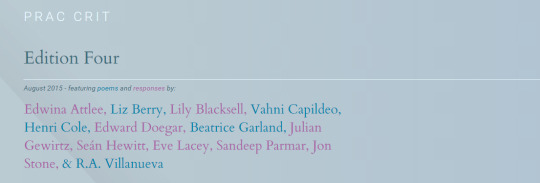
A reminder to myself that I also do critical writing! A short close reading of ‘The Academy of New Words’ by Beatrice Garland appears in the latest edition of Prac Crit, a rather slickly rendered online journal of poetry and criticism with a separate viewing pane for the subject of the critique alongside the critique itself.
I was initially unsure about this when approached by the editors, Sarah Howe and Vidyan Ravinthiran – I’ve written a lot of reviews in the past, of varying quality, but my approach tends to be quite – well, not close up. I talk more about groups of poems or patterns of poems, or better yet, try to identify and articulate the character of a whole book. In fact, the phrase ‘close reading’ slightly scares me, since I’ve always associated it with a very learned, academic approach to critical prose which requires a background in post-structural theory and god-knows-what-else.
This is somewhat ironic, because the poem I evaluate in this essay features as its principle conceit the idea of an ‘academy’ that is designed to have oversight and control of language but which rapidly becomes nothing more than a home to studious professors. I think that’s ironic anyway. Is it? OK, maybe just coincidental.
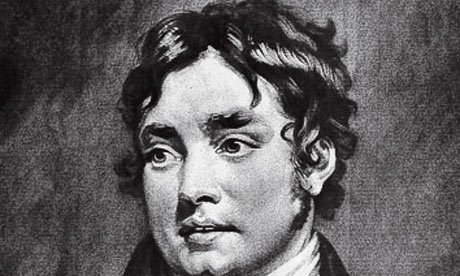
I find it incredibly, incredibly difficult to write knowingly political poems. I’ve been trying for years. The reason it’s difficult, putting it simply, is that my approach to poetry is to feel my way forward, whereas my approach to politics is to reason my way forward, and it all gets a bit oil and water.
The poem of mine published in The Emma Press’ Campaign for Poetry was accidentally political. I mean, it was a deliberate allegory that happened to work for politicians just as well as anything else.
Now I’ve managed to find my way into New Boots & Pantisocracies, the blog set up by W.N. Herbert and Andy Jackson to document 100 poets’ reactions to the 2015 UK election over 100 days. My contribution is number Two Fat Ladies, 88, and goes by the title of ‘from The Shapeswitching Suitboys: Incentivampire’.
Yeah, it’s a rhyming children’s poem. I envisage it as being part of a set – the Shapeswitching Suitboys are contemporary folkloric monsters based on modes of political thinking that are particularly ugly. Incentivampire isn’t Ian Duncan Smith exactly; he’s more the collective spirit of every political soundbite that talks about individual aspiration and hard work as if it’s the answer to systemic cruelty and inequality. Like the rest of the Suitboys (who I haven’t fully devised yet), his defining feature is that in he can appear in the guise of a benefactor.
I wrote it as a childrens’ poem because at the back of my mind I had the notion that you have to find ways to warn children about sinister ideologies, and encapsulating them in cartoon characters is one way to do that. I suppose the accompanying danger is that you caricature someone’s view unfairly, but you can avoid that if you make it clear your cartoon character doesn’t represent any person so much as he or she represents a disastrous way of thinking.
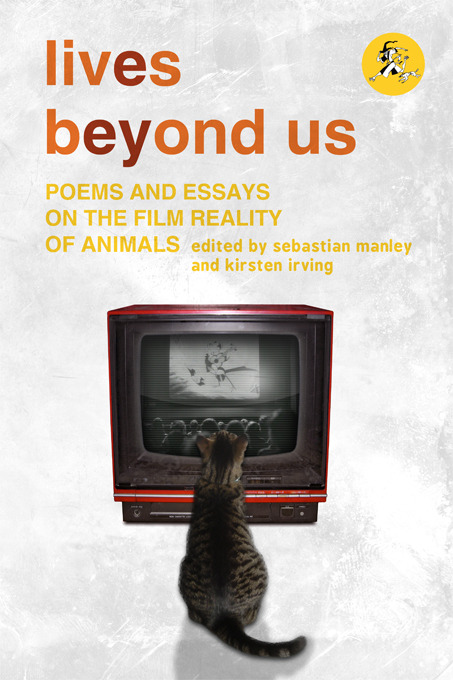
Lives Beyond Us is the first big Sidekick Books anthology/treasury without my name on the cover. The editors this time around are my Sidekick teammate Kirsty, who curated and edited the poems, and PhD film scholar Sebastian Manley, who commissioned and edited essays for the book.
I do, however, have an essay published in it. An essay that becomes, at points, a poem, or three poems, if you like. It’s called ‘BEAR INTERVENTION!’ and it uses Luis Buñuel’s Exterminating Angel as a springboard for exploring the idea of the bear as a variant of the trickster archetype, via The Jungle Book, Paddington, Shirokuma Cafe, The Golden Compass, and even Cabaret. No, there are no bears in Cabaret. You’ll have to read the essay to find out what the deal is with Cabaret. I will divulge that it involves a jolly song called ‘Sexual Betrayal’.
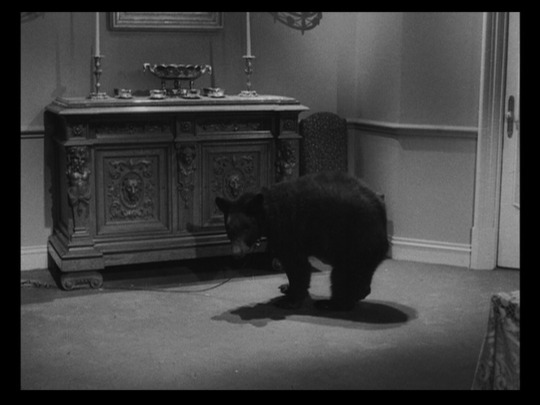
I also worked on the design and layout of the book, including the cover, which uses photocollaging to depict a house cat watching a scene from Hitchcock’s Sabotage in which a cinema audience watch Disney’s Who Killed Cock Robin? You see, it’s us watching an animals watching us watching an animal. I never get tired of explaining this conceit and expecting people to nod appreciatively.
The book is peppered with colour illustrations and movie stills, the former of which I bought from the Dover Pictura collection. The mixture of these plus some unusual formatting in the poems made the typesetting something of an epic journey. Feedback so far re. the aesthetics of the book is very good. Let’s hope booksellers and their customers agree.
We threw a launch party for Lives Beyond Us at the Genesis Cinema last week, with a free film quiz and short readings. Full account here.